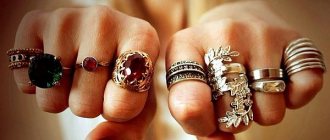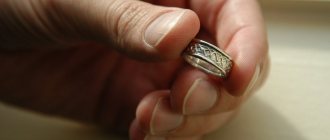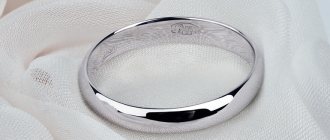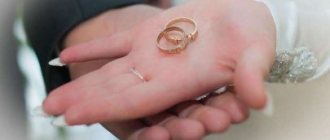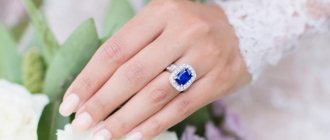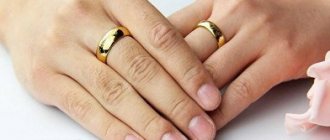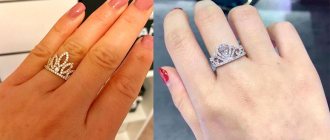Wedding rings are a symbol of the eternal love of spouses, which continues even after the death of the other half, and therefore many widows leave this important decoration on themselves in memory of their loved one. But the question arises, how to wear such a jewel now? A huge number of canons, traditions and superstitions prescribe various, often contradictory options, so understanding them is not so easy.
How to wear it for widowers?
If a widow, according to the most widespread tradition both in Orthodoxy and in secular etiquette, wore a wedding ring on the ring finger of her right hand, then there are six main options for what to do:
- Transferring your own wedding ring to your left hand is the most common solution, clearly understood by people with a wide variety of cultural backgrounds;
- Take off your jewelry and put the deceased’s ring on the left one;
- Leave your ring on your right hand, and put the deceased’s jewelry on your left hand;
- Transfer both rings to your left hand;
- Keep your own jewelry on the right, and wear your husband’s jewelry on a chain around your neck;
- Leave the deceased’s ring on it, and put your own in the coffin.
Advice! Sometimes it makes sense to even give the ring as charity to the church, asking them to pray for the repose of the soul of the deceased.
Each of these decisions is acceptable, and a woman's choice depends on many factors. For some, it seems more appropriate to preserve the memory of the deceased without displaying it, and in this case, the decoration can be left at home - in the red corner near the icons or in a jewelry box.
If the widow decides to keep the jewelry and continue to wear it, then, in addition to the symbolic level, the decision will also be influenced by the physical factor. Men's rings are usually much larger and may not fit even the largest middle or thumb fingers.
Sometimes the size of the jewelry can be reduced, but not always, especially if the jewelry has engraving or inlay. In this case, various options are acceptable - with a chain or with transfer to another finger.
FUNERAL RULES
Everything about funerals: funeral rituals and rules, important signs, warnings and prohibitions.
I constantly receive letters and calls with questions touching on the topic of funerals and requests for explanations of certain funeral signs and rules.
In particular, I wrote that the clothes of the deceased cannot be worn by his relatives, they must be distributed or thrown away. But when should this be done? I answer: the clothes of the deceased are taken out of the house no earlier than 40 days after his death.
Another question: is it necessary to leave a wedding ring on the deceased’s finger? Under no circumstances should a person be buried in a wedding ring! Along the way, I will explain what, in general, there are requirements for the clothing in which the deceased is dressed. On the day of the funeral, the deceased is dressed in new or completely clean (washed) clothes. It happens that a person has prepared funeral clothes for himself during his lifetime. In this case, you need to make sure that these clothes are clean and have not been previously used. It is customary to bury a person in clothing appropriate to the season and weather. Shoes should be with a back, soft and presentable.
But here is one of those questions that I have been asked more than once: “My dear aunt died of cancer. At the funeral, I kissed her on the forehead through the aureole. Was this a big mistake? I remind you of the essence of one of the most important funeral rules: if a person died from a cancerous tumor, and there is a suspicion that the cause of the disease and death was damage to cancer, blood relatives cannot kiss him, otherwise the cancer disease may “skip”. In this case, oncological problems appear within the first year after the funeral, which means that the person who made the mistake needs urgent professional help. But the corolla located on the forehead of the deceased serves as a kind of barrier that should protect relatives from harm. So, I hope the author of the question is not in danger.
I was recently asked: “Is it true that if a person gets drunk at a funeral, this is a bad omen? How does this threaten a person? It’s true that if someone gets very drunk at a funeral, there will probably be heavy drinkers in his family.
Next question from the letter: “When my mother-in-law was dying, she held my mother’s hand and whispered something. After this event, my relationship with my mother completely went wrong. I constantly felt some kind of coldness emanating from her. Mom died ten years later. And then, and now, I completely give up when I need to work. “Here, most likely, we are not talking about the transfer of a magical gift passing to a person who holds the hand of a dying witch. There is also such a witchcraft phenomenon as a dying curse. This curse is produced in exactly the same way as described above. This is a rather strong type of witchcraft negativity, which can only be eliminated by an experienced and qualified specialist.
I have repeatedly warned my readers that a pregnant woman should not visit cemeteries or attend funerals. But is it still possible for her to do something if she can’t help but go to the funeral? In this case, the pregnant woman's belly is bandaged with a red ribbon. Here, by the way, is a question on a related topic: “When I was pregnant, my husband’s father died. I accompanied my husband to the funeral, but did not go to the cemetery, I stayed in the car. Could this event have harmed my child? Since you haven't entered the cemetery, you have nothing to fear.
Another appeal: “I already received treatment from you a couple of years ago, and you helped me a lot then. But recently I buried my brother, and since then everything inside me began to hurt. Many of my late brother’s ailments seemed to become my ailments. Why could this be? There are two versions here. Perhaps you made some mistakes at the funeral that led you to your current state. But it is possible that your problems are of psychosomatic origin, that is, they are the result of stress. If you tried to imagine how your brother felt during his illness and “tried on” his illnesses for yourself, you could unwittingly program your body for the same negative processes. In any case, I recommend that you visit me in person.
This is interesting: There is no meaning in life, what to do
“Unfortunately, only now have I learned about many of the mistakes we made at the funeral. It turned out that my husband, his brother and sister of the late father-in-law were sitting in the car on the chairs on which the coffin was placed. We did not turn these chairs over to the ground or wipe them with holy water. And at home, of course, we all sat on them. So what's now?" Those chairs need to be taken outside, turned upside down and left in that position for several hours. Then wipe them with Epiphany water. Everyone who managed to sit on these chairs must undergo a reprimand using special witchcraft spells. Otherwise, diseases of the legs and genitourinary system are inevitable.
“If a deceased person is wearing a tie and buttons on his shirt and jacket, what could this mean for relatives?” The soul of the deceased experiences certain inconveniences, which is fraught with nightmares, health and nervous system disorders for his relatives.
“Can I take some black soil from my yard to plant flowers on the grave?” Sure you can. It is important to understand the general logic of magical regulations regarding cemeteries. To care for the grave and the surrounding area, you can use any things and tools taken from your home: shovels, paints, brushes, flower seedlings, soil, etc. These things can then be returned back, just do not forget to shake off the grave soil and wash all used tools in running water. But you should not use things that were previously items of clothing in the cemetery as rags. But from the cemetery it is forbidden to take home elements of fencing, monuments and other objects, as well as flowers and berries saturated with dead cemetery energy.
“Is it possible to take away the iron monument from the cemetery, since we will erect a new one - granite? Maybe there are some specific rituals that need to be performed before taking the old monument home (we live in a private house)?” My recommendations for this situation are outlined in the response to the previous letter. I strongly advise against taking the old monument home from the cemetery. Leave it somewhere in the cemetery or nearby. This is not such a valuable thing for the household!
“Some time ago, my relative committed suicide. Before that, he had repeatedly threatened suicide, so on the fateful day we did not take his words seriously. Feeling guilty towards him, I wrote him a note of apology and placed it in his coffin. Did I cause myself any harm by this action? I recently dreamed about this man. It’s like I’m hugging him and asking him to come back, but he’s pushing me away. “I don’t think you did anything fraught with negative consequences by leaving an apology note in the coffin. Very bad consequences await those people who give their clothes to the deceased or, even worse, leave their photographs in the coffin “as a keepsake.” Be sure to read my article: “PHOTO IN THE COFFIN.” The wives of deceased husbands make a sure spell for loneliness when they leave their wedding ring to the deceased and swear to him that they will never marry again. And the fact that the deceased pushed you away in a dream is good. It would be worse if he led you along.
The following situation is quite common: “We bought scarves and towels for the funeral, but these things were never needed. Can I use them now? In no case! Anything specifically purchased or set aside for a funeral may be used exclusively for the funeral. If things are never needed, they must be burned.
I will also comment on this letter: “When I buried my mother, I was advised to stand on a towel so that my legs would not hurt. So I did. But since then my legs have been bothering me all the time...” In order to get rid of leg diseases, they really do stand on a funeral towel, but at the same time it is necessary to say a special spell. If you don’t do this, you will not only not get rid of leg diseases, but, on the contrary, you will acquire them. Now seek professional help.
“You wrote that during a funeral, relatives should not get out of the car in front of the coffin. Does it matter that we entered the cemetery through one door and carried the coffin out through other doors? We left before the coffin was taken out. And we left the coins that were in front of the deceased in the coffin on the advice of the priest. Did we do the right thing? The funeral rule discussed in the question should be understood quite clearly: the relatives of the deceased should not get out of the car into the cemetery in front of the coffin. If people left through one door and carried the coffin out through another, then the sequence of actions does not matter. Coins that were in front of the deceased can indeed be left in the coffin. By the way, such coins have a wide range of applications in practical magic (for example, when casting spells on eye diseases and even to tame jealousy). But do not throw coins taken directly from your pocket or purse into a coffin or grave.
I often get asked what to do with the gold jewelry that the deceased was wearing at the time of his death? And can a widow wear her late husband's wedding ring? Any gold jewelry (including wedding rings) that the deceased person was wearing at the time of his death must be left in a vessel with holy water for a day, which provides, so to speak, “energy zeroing.” Then you can use them. Jewelry that belonged to the deceased, which was not on him at the time of death, does not require such manipulations.
This is interesting: 6 personal income tax line 070 how to fill out 2017
“In your book it is written: “A person who returns to the house after removing the body and before returning from the cemetery may die.” Is this the same situation when the coffin is on the street and a person returns to the house to check whether they took everything with them to the cemetery? Is it possible to take independent measures to neutralize the consequences of an error if it has occurred?” Yes, this is a fairly common situation, as a result of which a person who returns to the house after the coffin has been removed from it before the funeral procedure experiences serious health problems. Independent measures in such cases do not make any sense; a reprimand with special spells performed by a professional specialist is necessary.
Once they asked me: is it permissible to celebrate a wake a little earlier than the fortieth day? I strongly do not recommend doing this. The tradition of celebrating a funeral precisely on the fortieth day after death did not arise out of nowhere. Until the fortieth day, the soul of the deceased is still quite close to its relatives and places familiar to it. And on the fortieth day there is a kind of farewell to its earthly relatives, and the soul rises to higher spheres. Due to these circumstances, a premature farewell to the soul of the deceased will be perceived very negatively by it.
Another question on the funeral theme: “You wrote that after removing a deceased person from the house, it is necessary to wash the floor. What to do if the floors in the apartment are covered with carpet that cannot be removed?” This time I will not limit myself to a short answer, but will try to give a detailed and thorough explanation of this situation, so that the logic of the mentioned rule with washing the floors in the house after removing the body of the deceased is clear to readers. I hope that this approach will remove many related and additional questions. So, the magical rule requires that no cleaning be carried out in the house where the coffin with the body of the deceased is located. Otherwise, there is a risk that another resident may be “swept out” or “washed” out of this house. Since at this time friends and relatives come to this house or apartment to say goodbye to the deceased and express condolences to his family members, carpets are usually removed from the floors. After removing the body from the room, the floors in it are immediately washed by one of the relatively strangers (for example, a neighbor). This is done in order to “wash the dead spirit from the home.” But the point is not that the floors must necessarily be washed with water (although this is the recommended procedure). If the floors are covered with carpet that has not been removed, it is simply swept or vacuumed. In any case, cleaning is done from the far corners towards the front door. The water used for cleaning can be poured into the toilet (unlike the water used to wash the deceased - it is poured onto the street under any non-fruiting tree outside the yard). Then the person doing the cleaning closes the front door behind him and leaves.
Consider the following situation: “I am turning to you for advice. Once I wrote to you about my sister’s illness, you invited us to your reception. Thank you for the invitation, but we were late for the visit, my sister died. The diagnosis could not be established. Now about the main thing. After her death, no one has peace; she is always present in the house and calls everyone to her. No, this is not self-hypnosis! Suddenly, the chandeliers suddenly begin to swing (we live on the 9th floor, transport cannot influence), and then her voice begins to call her daughter. Or some cloud appears for a moment and immediately becomes cold, although the room is hot. Sometimes the furniture starts to move on its own. After my sister’s death, we renovated her room, now the wallpaper has fallen off, the corners are all wet, and at night there is rumble, creaking, and footsteps. The daughter of the deceased was already in the hospital with a nervous breakdown, she had quarrels with her husband and our mother was in tears all the time. We ask mom what’s wrong, she replies that the tears are choking her, and her daughter calls her to her. Vladimir Petrovich, what should I do? We already went to church, lit candles, asked the priest to pray, explained the situation to him, but nothing helps. Our only hope is in you!” If the phenomena indicated here occur within forty days from the moment of death of the deceased, you just need to wait, since after the fortieth day such phenomena most often disappear on their own. But if forty days have already passed, and manifestations of activity on the part of the soul of the deceased person continue, then it is necessary to take special measures. First of all, remove all personal belongings of the deceased from the house, distribute them to strangers or throw them away. A specific method for solving this problem is as follows: set fire to any hat that previously belonged to the deceased, and walk around the apartment with the burning hat, fumigate the home with smoke, then leave the house with the burning hat and let the hat burn out on the street. The described method works well. Invite a priest to the apartment, but preferably a specialist in the field of magical manipulation to carry out cleansing rituals. Since I am constantly invited to carry out work related to the elimination of negative energy in the home, I warn you that I provide such services only within the Kyiv and neighboring regions. I noticed that the letter mentioned the fact that renovations were being carried out in the deceased’s room. The owners of the apartment made a big mistake! During the first forty days after the death of a person, you should not even move furniture in his home, creating a different interior. And repairs can be done no earlier than a year after the person’s death. If you started renovations earlier, especially in the deceased’s room, this could cause unpleasant activity on the part of the soul of the deceased person in your apartment.
Finally, an important warning. If any funeral rules set out in this article and in the articles linked to below were violated, urgent measures must be taken. Urgent! Otherwise, negative consequences will not keep you waiting, which is confirmed by the sad experience of millions (I am not exaggerating - exactly, millions!) of people. Some funeral mistakes are so serious and fatal that they risk another imminent death in the family. What exactly needs to be done? Any attempts to fix the problem yourself are a completely pointless waste of precious time. Immediately seek help from a professional specialist who knows exactly what needs to be done and knows how to do it correctly! I am not at all trying to force my services on you; you have the right to independently find a specialist who you can trust to solve your problems. But most importantly, don’t waste time! If you come to the decision that you need to turn to me for help, click on the button at the bottom of the page and write a letter. Right now.
This is interesting: Pay money in hand
Information about funeral rules, signs and recommendations is also available in the following articles on this site (click on the titles):
If you need to contact me personally for any clarification, consultation, or in connection with the need to solve certain problems, click on the button and write me a letter:
Signs and traditions
Wedding rings, including widow's rings, are surrounded by a huge number of different superstitions.
Popular wisdom does not recommend wearing the jewelry of dead people, as it is believed that precious metals absorb energy. That is, both illness and accident seem to be imprinted on the ring and inevitably affect the new owner, worsening his health and well-being.
For the same reason, in no case should such rings be inherited by children and other younger relatives, since the new couple may repeat the tragic fate of the previous one.
But with rings belonging to spouses who happily celebrated their silver or even golden anniversary, everything is not so simple. Some signs consider such a gift to children to be a very good sign, protecting the new family from any problems. Others still do not recommend making such gifts, since children with a given ring will steal the happiness of their parents.
A ring that falls during a wedding or social ceremony is a sign of imminent separation and the possible death of the other half. To avoid a terrible fate, you should thread a regular thread through the jewelry for a while, and then burn it along with the accumulated negative energy.
How to relate to such beliefs, everyone decides for himself. On the one hand, wisdom preserved over the centuries often has some basis, on the other hand, the Orthodox Church does not have a very positive attitude towards any signs.
Can a widow wear a wedding ring?
You can wear the product, but you should do it as carefully as possible. It all depends on the character of the person, as well as his attitude towards the deceased. If a person sincerely believes that this item will protect him, then it will be so. But, if the widow is tormented by doubts and she is afraid of negative energy, then it is better to give the ring to the relatives of the deceased, or simply remove it from sight.
Most often, people simply put away the product as a keepsake, but at the same time that it does not remind of the tragedy. Psychics, in turn, believe that in no case should you wear the product after death - because of this, the soul of the deceased may gravitate back to his family, which can cause him to get lost.
However, the church, on the contrary, disputes this version, saying that it is still possible to wear the product. A widow is even allowed to wear the ring of the deceased, since there is the strongest connection between lovers.
What do the two rings on your left hand mean?
Such a position of jewelry really quite often means widowhood, but you should not give an unambiguous interpretation if you don’t know the person well:
- Very often girls wear an engagement ring on their left hand along with a wedding ring on their right;
- This may also mean that the spouses are Catholics or even atheists.
Important! Sometimes, due to injury, wearing any jewelry on the right hand becomes uncomfortable or simply impossible, and in this case the left remains the only alternative.
View of religion
World religions have different attitudes towards wedding rings in general, and widow's rings in particular.
In Orthodoxy, wedding jewelry is worn on the right hand, which is used to make the sign of the cross and behind which, according to legend, there is a guardian angel. After the death of a spouse, one’s ring is moved to the left hand, and the second one is left with the deceased. A more preferable option is to donate your jewelry to a parish. Orthodox Christians can leave a treasure from their deceased home next to the icons in the red corner.
Catholics wear their wedding band on their left hand, and after widowhood they change it to their right hand or take it off altogether.
In Judaism, only women wear a wedding ring as a sign of belonging to their spouse. In the event of the death of the other half, the widow simply removes the jewelry , and then can either keep it in the house or give it to charity.
In Islam, there is basically no tradition of exchanging wedding rings. Men are prohibited from wearing gold, and even silver jewelry must be extremely small and discreet. But as a wedding gift for the bride, various jewelry, rings, and earrings are often presented. There is no need to change the position of the jewelry after the death of the husband.
Buddhists sometimes exchange rings to unite the energies and destinies of spouses, but this is not a mandatory wedding tradition. After widowhood, it is better to donate the jewelry to charity so as not to create a connection, preventing the deceased from incarnating in a new life.
What to do with the ring after the death of your husband, the opinion of Christian clergy
After the death of a loved one, a woman is depressed and broken. She wants to keep with her as many things as possible of her deceased spouse, as a symbol of eternal love and devotion. In particular, the spouse’s wedding ring is considered such a symbol. The clergy do not prohibit the further use of this decoration. Church ministers say that there are no prohibitions on wearing a wedding ring after death.
However, if a woman wants to hide it in a jewelry box, or behind an icon, then this is also permissible. In addition, the church does not prohibit giving a wedding ring to someone as alms (donate to the temple, sell the metal, melt it down, and send the proceeds to orphan funds).
The only thing that the church prohibits is burying one of the spouses in a wedding ring if the other is alive. This is permissible to do only if both spouses have died. Then, it is considered that their earthly journey is completed.
Recommendations from psychologists
The main advice of psychologists is that the decision made by the widow or widower be comfortable for them.
If it is painful for a woman or a man to come across constant reminders of the lost and ended happiness together, then it is better not to leave such a significant thing on your hand, so as not to reopen the wound.
If, on the contrary, the presence of a ring creates a feeling of security and that a loved one is looking after your other half from the other world, then the jewelry should be left.
Advice! For religious widows, it is recommended to ask for advice from a confessor, since the support of significant people at such a difficult moment is incredibly important.
